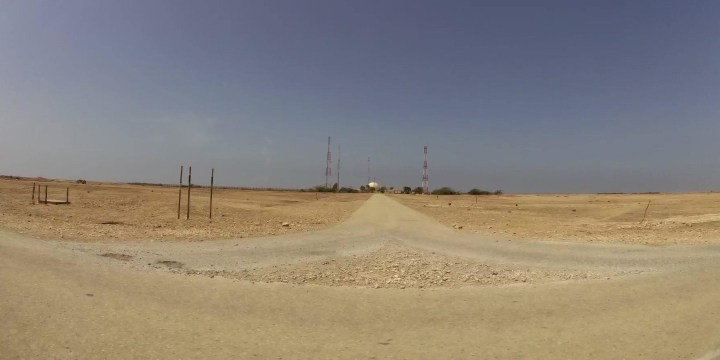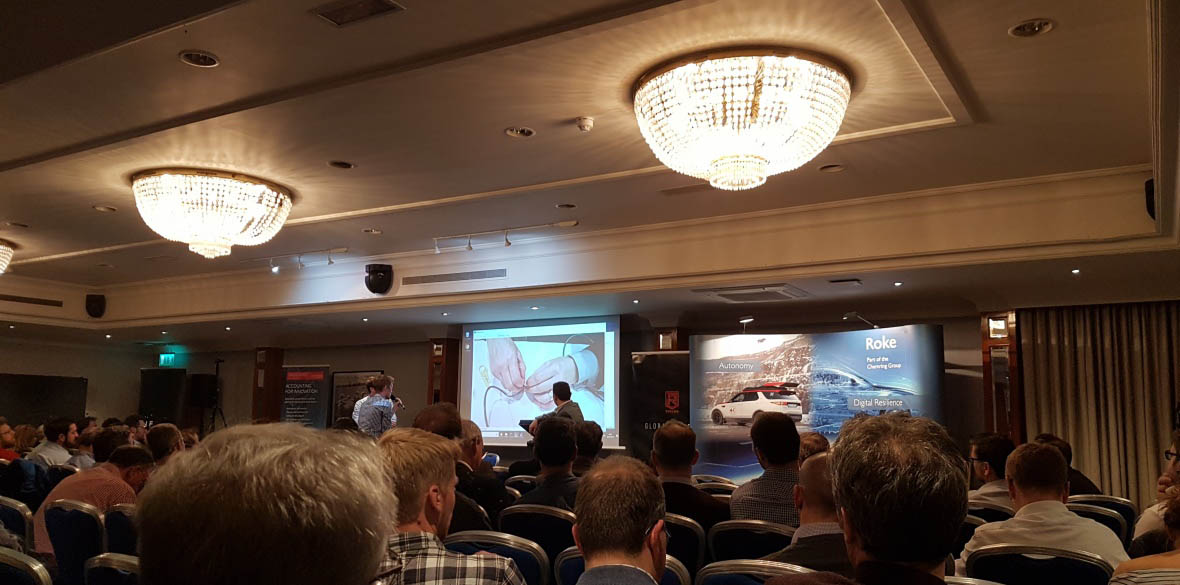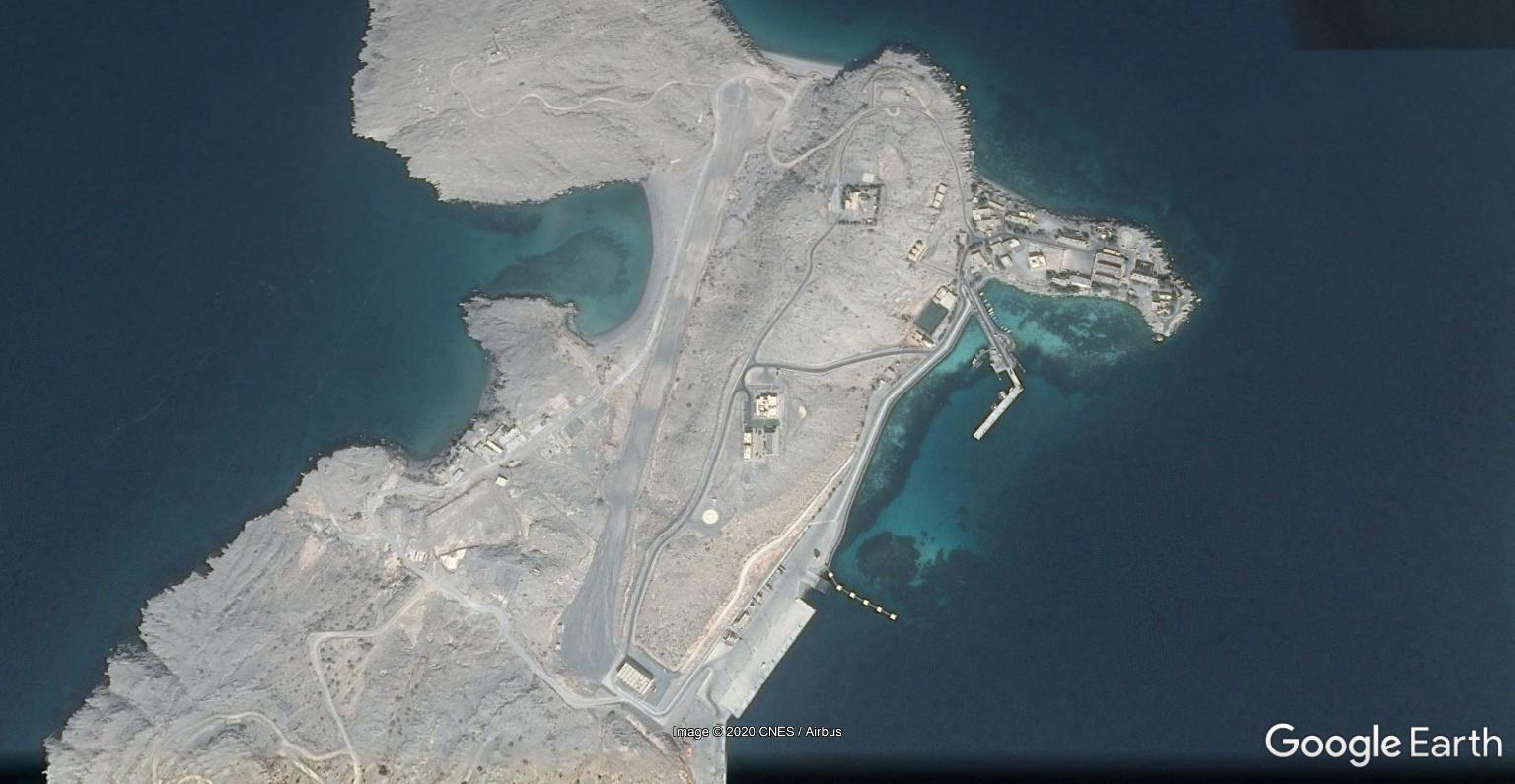Declassified UK
British spy agency refuses to acknowledge its bases in Gulf dictatorship

Britain’s largest intelligence agency, GCHQ, is refusing to publish details of its bases in Oman, where it is believed to operate three surveillance sites.
- Declassified publishes pictures of what appears to be one of the sites for the first time
- GCHQ admits sharing intelligence with international partners ‘to combat threats in their regions’ — but refuses to tell dissident whether it spied on his protest against Prince Charles’ visit to Oman
- Former business secretary Sir Vince Cable defends selling repression gear to Oman, telling Declassified ‘we trade with many undemocratic countries’
GCHQ, which operates spy sites across the UK and at several secret facilities overseas such as in Cyprus and Ascension Island, is refusing to publish basic details of its bases outside Britain, Declassified has found.
The secrecy comes despite a recent report by Parliament’s intelligence committee finding that the spy agency’s new cyber security building in London does “not represent value for money”.
Documents shared by US whistleblower Edward Snowden in 2014 indicated that GCHQ operates three sites spread across Oman, where it intercepts undersea cables carrying internet traffic around the Gulf.
Oman is ruled by a repressive sultan who keeps a ban on political parties and free speech, making it almost impossible for local Omanis to know what GCHQ is doing in their country.
GCHQ is not subject to Britain’s freedom of information laws, but it is required to answer environmental impact requests and has previously disclosed documents about its emissions within the UK.
However, the spy agency is refusing to release any details about its environmental impact in Oman, or whether these facilities have been used to help the Sultan spy on his domestic opponents.
One GCHQ site, known as Overseas Processing Centre 1, is believed to be in a compound in Seeb, near to the sultan’s palace on the outskirts of the capital Muscat.
It is not known what type of emissions the site produces from its multiple radio masts and satellite dishes. Two schools are located nearby.
Another site, CLARINET, appears to be located in the south of Oman near the border with Yemen, in close proximity to a horse riding school and another royal palace.
Evidence seen by Declassified indicates that CLARINET is a smaller version of the GCHQ station in the Cornish town of Bude, in southwest England, where a transatlantic cable comes ashore.
We are publishing photos of what appears to be CLARINET for the first time, which show its ‘golf ball’ array, satellite dish, radio masts and unmarked entrance.

CLARINET seen from above and from the main road, with satellite dish, golf ball and radio mast.
GCHQ’s third site in Oman, TIMPANI, is reportedly near to the Strait of Hormuz, one of the world’s busiest shipping lanes.
Declassified understands TIMPANI is located on the Musandam peninsula, a remote part of Oman that Britain’s special forces, the Special Air Service (SAS), helped occupy against the wishes of local people in 1970. Prince William has recently visited the area together with a former GCHQ strategy director.
Environmental impact
The installation of British military communication facilities in other parts of the world has caused controversy. A proposal by the Ministry of Defence (MOD) to expand its long-range Pluto antenna in Cyprus led to riots in 2001.
Local Cypriots feared that the electromagnetic field generated by the 190-metre high radio masts could cause child cancer and disrupt the migration paths of flamingos.
The project was eventually approved, but it required environmental assessments by the MOD, Cyprus’ Ministry of Health and the internationally recognised Ramsar Bureau.
The Council of Europe recommended in 2004 that the UK must: “Monitor radiation levels in order to assess effects on bird orientation, but in the first place to assure local populations that there are no health problems.”

Protest outside a British military base in Protesters in Cyprus on 2 July 2002 demonstrating against the erection of the Pluto II telecommunications mast, over fears radiation may cause health problems. (Photo: EPA / Katia Christodoulou)
Despite this precedent, GCHQ told Declassified: “We cannot confirm or deny whether we hold any environmental information in the scope of your request. Specifically, we do not comment on the presence of any GCHQ facilities or staff outside our avowed locations in the UK.”
Citing a legal exemption, GCHQ argued that disclosure might jeopardise “international relations, national security and public safety.”
It added: “If a facility was confirmed by us, this might expose those facilities to hostile actions including the potential of physical attacks on staff or equipment. It might also reveal the nature of our capabilities which would undermine the effectiveness of those capabilities, damaging our ability to safeguard national security.”
Declassified asked GCHQ for an internal review of its decision, on the grounds that the agency overstated the risk and underestimated the public interest in transparency.
No hostile groups in Oman were specified by GCHQ in its initial response, and the US State Department has said there were “no terrorist incidents reported in Oman in 2019”.
We also argued that GCHQ failed to consider the public interest in transparency around disclosure of information about radiation from the Overseas Processing Centre 1 and the possible impact on children and wildlife.

A satellite view of the GCHQ site in Seeb. (Photo: Google Earth)
The site in Seeb has a satellite dish within 1km of the Zainab Althaqafiya girls school and 1.2km of the Anas bin Al Nadr boys school. It is 3km from the Al Batinah coast, which is designated as an Important Bird Area according to BirdLife International.
Declassified highlighted that GCHQ is operating in an autocratic country – not a liberal democracy like Cyprus. As such, there are far fewer means available to journalists or local residents to ascertain the environmental impact of GCHQ’s facilities in Oman.
It is a criminal offence to criticise the sultan of Oman or the State, punishable by a custodial sentence of up to seven years in prison.
According to Freedom House, in Oman “the law does not provide freedom of information guarantees. Openness and transparency are limited in practice by the concentration of power and authority in a small inner circle around the sultan.”
In its internal review, GCHQ acknowledged “there were some areas where GCHQ’s response was not sufficient”, but upheld its original decision. The agency told Declassified: “Our work is highly sensitive and must often be carried out in secret, and disclosure of information about our sites would be damaging to national security.”
Spying on Omanis?
GCHQ did however indicate that it was sharing intelligence with British allies in the Gulf. It said in the internal review: “We share our own expertise and intelligence to better equip our international partners to combat threats in their regions.”
GCHQ did not elaborate but it is likely this signifies helping allied regimes counter internal challenges to “security”.
GCHQ has long-standing links to Oman’s intelligence agencies such as the Oman Research Department (ORD). Diana Darke, an Arabic linguist who worked for GCHQ in Cheltenham in the 1970s, went on to work as Head of Media for the ORD in the early 1980s.
Darke’s duties at the ORD included “creating a research library, providing daily press summaries, initiating an Arabic Reuters service,” according to her LinkedIn profile. She has not responded to Declassified’s requests for comment.
This year it emerged that Reuters had run an Arabic service in the Middle East that was secretly funded by British intelligence in the 1960s and 1970s as part of a policy promoting internal “stability” and access to resources in Gulf states.
The ORD was later renamed as the Internal Security Service (ISS), which Human Rights Watch accused in 2019 of targeting “pro-reform activists, often for views they expressed on social media platforms like Facebook and Twitter.”
Activists were then sentenced to prison terms “using vaguely defined laws that limit free speech, including crimes such as ‘insulting the sultan’ and ‘undermining the prestige of the state’.”
Khalfan al-Badwawi, an Omani activist who now lives in exile in Britain, told Declassified he was repeatedly targeted by the ISS for taking part in the Arab Spring pro-democracy uprising and protesting against corruption.
In one case, he used Facebook to organise a peaceful protest against a Royal visit by Prince Charles to Oman in 2013. The trip was designed to “promote Britain’s diplomatic, commercial interests” in Oman, which at that time mainly concerned a £2.5-billion arms deal with BAE Systems.

Prince Charles visiting Oman in March 2013, while Khalfan Al-Badwawi was in the custody of the Internal Security Service for planning a protest. (Photo: EPA/Hamid Al-Qasmi)
Al-Badwawi’s protest never went ahead. Masked Omani special forces swooped on his car in a high-speed manoeuvre and bundled him into solitary confinement. “It still gives me flashbacks today,” he said. “That type of kidnapping was new for activists in Oman, none of us had experienced it before. It was shocking.”
The authorities put him into isolation for five days in mid-March 2013 where the ISS subjected him to psychological torture techniques. Confined to a windowless cell, he endured extreme variation in temperature, constant bright lights and relentless pro-Sultan anthems blaring from a speaker in the ceiling.
He was released once Prince Charles had left the country. The Gulf Centre for Human Rights included his ordeal as a case study for a report about torture in Oman.
After Al-Badwawi saw the Snowden revelations about GCHQ sites in Oman, he began to suspect British intelligence had a hand in his detention. This year he made a subject access request asking GCHQ for his personal file, but the agency told him “it is not processing any personal data to which you are entitled to have access.”
The wording of the response leaves open the possibility that GCHQ does hold files on Al-Badwawi, but believes it is not required to disclose them.
Al-Badwawi has established separately that the Foreign Office logged his attendance at a book launch in London last January, where he criticised British involvement in Oman. GCHQ is overseen by the Foreign Secretary.

Subject access request response to al-Badwawi by Foreign Office.
‘Nasty neighbourhood’
Oman is known to have acquired cutting edge surveillance gear from BAE Systems’ Applied Intelligence arm and a Danish subsidiary. The same equipment, called Evident, could also be used by GCHQ at its sites in Oman.
Evident allows users to intercept the internet traffic for an entire country, pin-point and follow people’s location, and decrypt private messages. The export of Evident is believed to have taken place after the Arab Spring protests in 2011, and could have been used to target pro-democracy activists such as al-Badwawi.
UK trade rules stipulate that military and cyber equipment should not be sold to a country if “there is a clear risk that equipment might be used for internal repression”.
However, former business secretary, Liberal Democrat Sir Vince Cable, whose department approved some of the deals, told Declassified: “You say that the regime in Oman is undemocratic. I don’t know. I have never been or met anyone to talk about Oman. My superficial impression was that, in a nasty neighbourhood, the sultan’s regime was one of the less appalling. In any event we trade with many undemocratic countries including products covered by the licensing regime.”

Staff from BAE Systems Applied Intelligence demonstrate how to wiretap a conversation at a Cynam event in Cheltenham, March 2019. (Photo: Phil Miller)
Cable, a former chief economist to Shell which operates major oil fields in Oman, appears to have been selective in his analysis of the Gulf monarchies. Al-Badwawi fled Oman in 2014 and won asylum in Britain, where an immigration judge ruled he “would be at real risk on return to Oman because of his political opinion”.
Since then, the crackdown on dissent in Oman has continued. In June, the sultan issued a decree to set up a Cyber Defence Centre as a new division of the ISS. The Gulf Centre for Human Rights described the move as a “dangerous development”.
It means the ISS “fully controls the devices and data of all institutions and groups of society and may use this control to provide evidence and information about internet activists who express their opinions contrary to the government on public issues of concern. This may result in threatening and imprisoning internet activists.”
On July 19, the ISS summoned internet activist Ghazi Al-Awlaki to a police station, due to his political activism on social media. According to the Oman Centre for Human Rights, Al-Awlaki was arrested in Dhofar province, in the south of Oman near the border with Yemen.

A map of undersea internet cables shows landing sites in the south of Oman near Salalah, in the east near Muscat/Seeb and the north around Musandam. (Photo: Submarine Cable Map)
This area is under heavy surveillance, with many golf ball arrays dotted throughout the region. Among them is believed to be GCHQ’s CLARINET site in Salalah, near to where an undersea cable comes ashore.
The Omani police and embassy in London did not respond to Declassified’s requests for comments on Al-Awlaki’s detention. He was held without access to a lawyer or his family until his release on 7 September, when Britain’s defence secretary Ben Wallace visited Oman.
Stealing a nation
GCHQ’s third site in Oman, TIMPANI, is believed to be located on Jazirat Umm al Ghanam, an island off the Musandam peninsula on Oman’s northernmost tip where an important undersea communications cable lands.
Opposite Iran, Musandam juts out into the Strait of Hormuz, the narrow stretch of water through which a third of the world’s oil supplies are shipped.
In December 2019, Prince William went to Jazirat Umm al Ghanam as part of a visit to Musandam Naval base. He was accompanied by his private secretary Simon Case, a former GCHQ strategy director.

Omani Governor of Musandam Ibrahim Al-Busaidi received Prince William upon arrival in Musandam on 3 December 2019. Former GCHQ strategy director Simon Case walked behind the Prince, out of this shot. (Photo: EPA-EFE / Stringer)
Local people are reportedly banned from approaching the island, where numerous British personnel appear to be stationed while on loan to the Omani Navy.
Last year the British government also held its first ever joint UK-Omani infantry training session in Musandam, named Exercise Jebel Storm. These high-level Royal and military engagements took place despite worsening repression in the remote region.
In 2018, six men from Musandam were sentenced to life imprisonment in Oman on what Amnesty International called “vague grounds of national security”. The human rights group believes the men were engaged in “peaceful activism and campaigns for the rights of Musandam’s residents”.
Yousuf Al Shehhi told Declassified that his nephew, Mohammed, was one of the six men serving life in prison. “They tried to contact Amnesty about the demolition of houses and cultural heritage in Musandam,” he explained, “and share information on WhatsApp about what was going on.”
This November, Al Shehhi’s nephew was suddenly released from Oman’s notorious Sumail prison when the sultan pardoned four of the six prisoners, two years into their life sentences.
Although Musandam is part of Oman, the peninsula is cut off from the rest of the country by the United Arab Emirates and many who live in the exclave believe they should be independent.

A satellite view of Musandam. (Photo: Google Earth)
“I was arrested in high school when I was 17 and held for 25 days,” Al Shehhi said, describing his early activism. “They kept me in an underground prison for a week.”
Musandam became part of Oman in 1970 following Operation Intradon, a secretive military campaign by Britain’s SAS to take control of the peninsula from local people and hand it over to the sultan. “Britain stole my country,” Al Shehhi told Declassified.
Little is known about Intradon, and a file that could shed more light on the operation is being withheld from the National Archives.
Al Shehhi has managed to view some Foreign Office papers which show that by November 1970 Whitehall was planning “a change in emphasis from a purely military operation to assistance over the introduction of an administration into the area”.
This suggests the region was autonomous before Operation Intradon, and Yousuf claims it was not until mid-December 1970 that the Omani flag was raised for the first time in Musandam — after it had been redesigned and the area’s traditional flag replaced.
Al Shehhi says his community is using documentary evidence to demand its freedom and will “never stop until we make a good future for our people”.
In addition to the three GCHQ sites in Oman, the Royal Navy is building an aircraft carrier base in the port of Duqm and the British army is developing a tank firing range in Ras Madrakah.
The Ministry of Defence has not responded to Declassified’s request for environmental impact assessments of its bases in Oman. DM
Phil Miller is a staff reporter for Declassified UK, an investigative journalism organisation that covers the UK’s role in the world.
Follow Declassified on Twitter, Facebook and YouTube. Sign up to receive Declassified’s monthly newsletter here.















 Become an Insider
Become an Insider
Comments - Please login in order to comment.